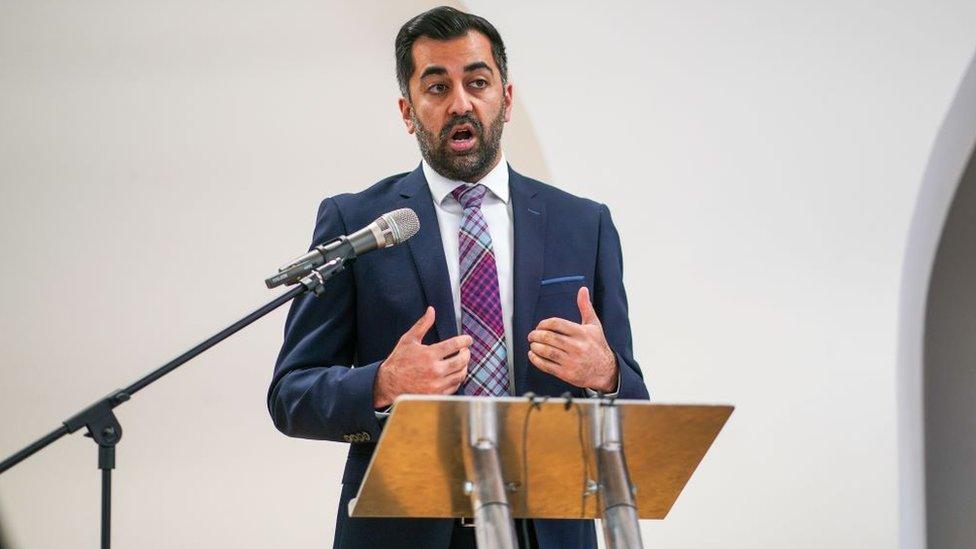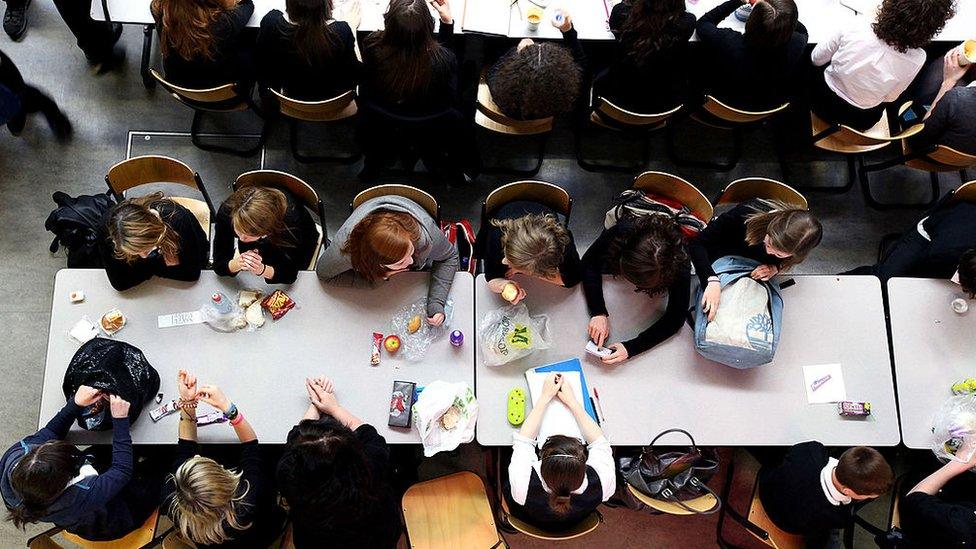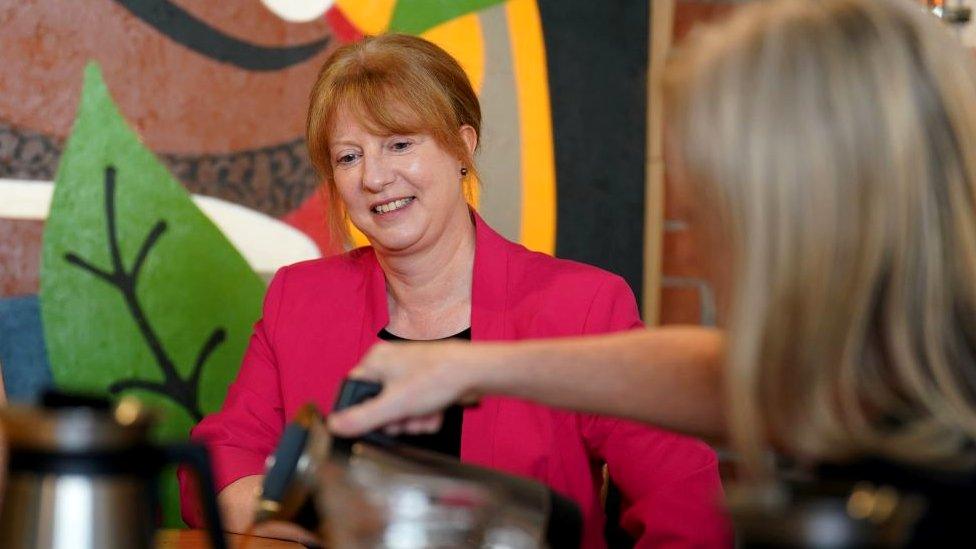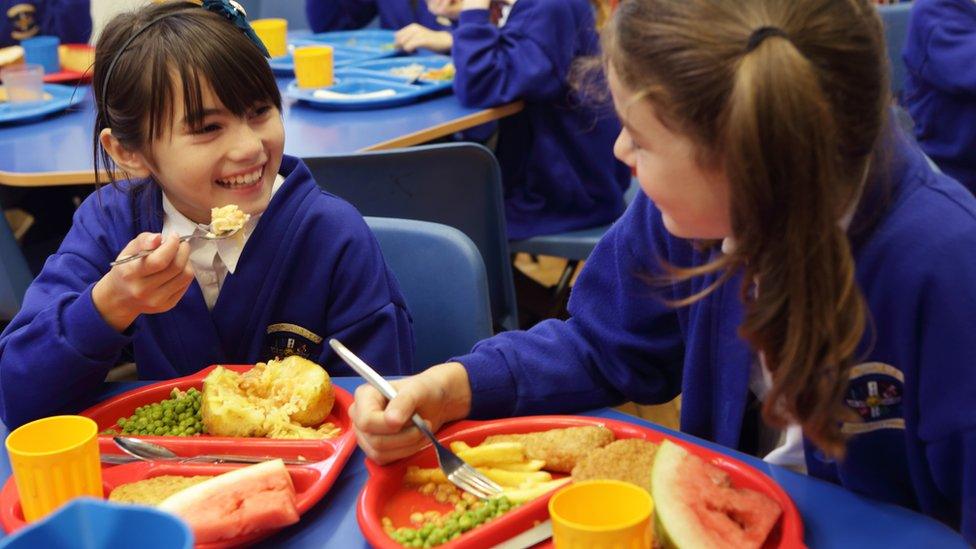The politics of priorities
- Published

First Minister Humza Yousaf spoke on Wednesday during an anti-poverty summit in Edinburgh
Humza Yousaf is not the only political leader asking some tricky questions and challenging his party's orthodoxies.
Tight public finances and his focus on poverty are forcing the new First Minister to question whether it is sustainable to keep offering tax-funded provision to everyone.
The axing of promised funds to universities and colleges is a sign of how sharp the departure from budget plans may become, with a mid-year budget statement set for later this month.
Squeezed government budgets are forcing some uncomfortable reviews of past commitments by politicians in power and those who aim to become so.
Sir Keir Starmer is on a journey away from abolishing Labour's commitment to remove student tuition fees in England.
He must surely be aware that a similar move, while in government, did immense damage to the Liberal Democrat party, from which it is yet to recover.
That extended to Scottish politics, where the U-turn didn't even apply. One lesson may be that it's best to ditch promises while in opposition, however tricky, because there's a very high price for ditching them while in government.
Conservatives have promises from their succession of prime ministers which have disappeared into the sand.
Remember the "once-and-for-all" solution to England's problems with social care, apparently removing the need for people to sell their homes to realise the funds necessary for residential care?
That hasn't aged well since Boris Johnson promised it. Indeed, it seems to have disappeared. And the more recent promise of a big expansion to childcare is still located somewhere over the horizon.
'Expensive group hug'
So Humza Yousaf is not alone in facing up to the challenge, and asking one big question about the way money is spent by government in Scotland.
This was posed in an interview with the Daily Record:, external Why should his daughter have her school meals provided at council expense when he, on the first minister's salary, could afford to pay for them?
This, we are now told, was not a way of reneging on the SNP manifesto promise to extend free school meals to the top end of primary school. His daughter is in secondary.
But it is a very sharp departure from SNP orthodoxy under the leadership of Alex Salmond and Nicola Sturgeon.
For nearly 16 years, the direction of travel was 'universalism' - free stuff for all, whatever your ability to contribute.

There are doubts over the provision of free school meals to older children
It was a practical and popular expression of how Scotland could do things differently, with everyone included, as if in an expensive group hug. This was using the powers of devolution, while looking to so much more with the powers of independence.
The taxpayer would stump up for free eye and dental checks and for personal and nursing care for those in need of it (pre-dating the SNP in government), followed by tuition fees for students and free prescriptions.
Bridge tolls were abolished. And one of several reasons for the current ferries fiasco is that subsidising sea crossings to become equivalent to the same distance by road generated a lot more demand at taxpayer expense, not just from islanders but from vacationers with their camper vans.
The Scottish government felt able to freeze council tax and compensate councils for nine consecutive years. Those who saved most were those in the most valuable homes.
Once they had been handed powers over severe weather payments, Scottish ministers jettisoned temperature thresholds in favour of payments for all, whatever the weather.
College mergers
But that question about the teenage Yousaf's school dinners puts a question mark over all this.
If funds are needed for a priority such as tackling poverty, and if funds are constrained, then why not require more from those who can afford to contribute?

The new finance secretary, Shona Robison, will soon present the medium term financial strategy
The new first minister is talking the politics of priorities, and he wants his top priority to be poverty reduction. Another word making significant appearances in Mr Yousaf's speeches referring to finance is that it must be 'sustainable'.
That is, making sure the promises made for the next year or two can be sustained for future years. The public spending watchdog, Audit Scotland, has issued repeated warnings about that, in the face of demographic pressure and the fast rising cost of healthcare. Perhaps it is now finding an answer.
An early indication of how the new cabinet is handling this came through the Scottish Funding Council, which allocates government money to universities and colleges.
There was no attempt to massage the figures, removing money through the back door. Some £46m pledged to the tertiary education sector, to help it with the transition to different teaching and learning methods and perhaps to ease the merger of institutions, was withdrawn. That was less than a month into the financial year.
It may serve as a warning to others - that even within a budget year, no-one can feel safe that promises and budget plans will be honoured. It will certainly serve as a warning to college and university principals about their place in Humza Yousaf's priorities. Their willingness to accept Scottish government constraints on student tuition income, in order to avoid fees, is looking fragile.
Treasury squeeze
We ought to learn more about priorities and sustainable finance later this month when then the new finance secretary, Shona Robison, presents the medium term financial strategy.
On some past occasions, that mid-year take on budgeting has said and done little to enlighten us. This time might be different, as the first big opportunity for new ministers to set out their revised priorities, reaching beyond the next Holyrood election, scheduled for 2026.
With a time horizon of five years, it faces some very tight squeezing of Westminster budgets and consequent tightening of the block grant to Holyrood.
Experience suggests that planned Treasury squeezes do not turn out as bad as first set out. But for now, that's what Humza Yousaf and Shona Robison have to contend with.
Related topics
- Published3 May 2023

- Published24 March 2023

- Published28 November 2020
